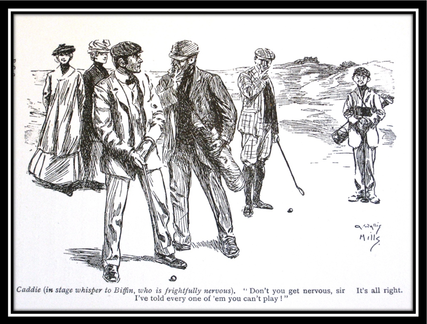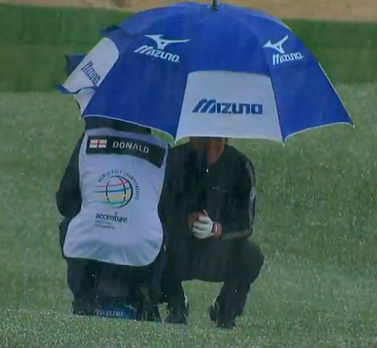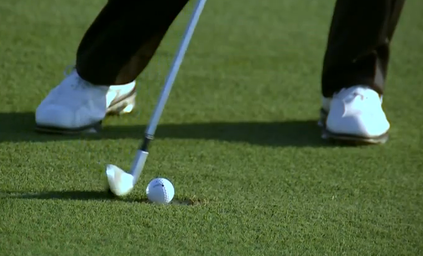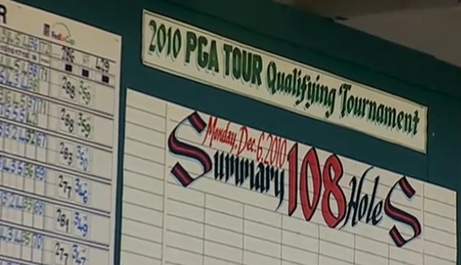 A golf handicapping system is a very helpful and indeed useful system for an average golfer that allows them to compete with superior skilled or lesser skilled golfers and was devised primarily to create a level playing field for all golfers so that they can enjoy their game a whole lot more. It would make no sense for an 18 handicap golfer to compete with a scratch handicap golfer “off the stick” as the scratch golfer would win the match’s one hundred percent of the time. However when playing with a handicap the 18 marker has a chance every time he/she plays against the scratch marker to win the match. So a golf handicap is as I said a very helpful system for an average golfer to enjoy their golf. However the golf handicap for an elite level golfer can actually be a big handicap for their ongoing improvement if he/she is considering becoming a professional tour golfer some time in their future. Why? Well, a golf handicap by its very nature adjusts the standard of the golf course to accommodate differences in tee positions, weather and the handicaps of the golfers competing on the day.  Professional golfers don’t have handicaps - they play golf against the par of the golf course whether it is raining, windy, very cold or very hot. So the sooner you can remove the handicap crutch from your game and focus on competing against the par of every golf course you play, the better it will be for you in the long run. The par of the golf course should always be your standard, not your golf handicap. At Pro Tour Golf College we are far more interested in a golfers competitive score average than their handicap. We have worked with countless golfers who claimed to have low handicaps but upon further investigation and analysis of their game we concluded that their actual competitive score average was a lot higher than their handicap suggested. “Part of the reason for this is the ‘throw away’ attitude towards bad rounds that amateur golf fosters. Keep your best cards and throw away the bad ones and you end up with a false representation of your golfing ability.” In professional golf every golf score counts all of the time! So we suggest that if you’re considering playing professional golf or even top level amateur golf then you should start to track your score average for every golf score you produce in tournaments. This means that if you shoot an 85 or worse you have to add it to your collection of golf scores.  Any golfer can look good if the only scores they post are their best golf scores, and this will be detrimental to your development in the long run. Yes it hurts to shoot scores a lot higher than your expectation, but get over it quickly because that is the nature of competitive golf. In many ways it is the same as golfers preferring their lie when practicing shots. If you always prefer your lie in the bunker and then you’re faced with a half-buried lie in the sand at a crucial time in a tournament, how do you think you would handle it? And the same can be said of golfers who take the ‘gimmee’ offered to them when they play a match with their friends. Hole every putt and never practice the bad habit of not finishing the hole. To post just your good golf scores is setting you up for a big fall. When you are playing in an important tournament and are not playing to your perceived level of expectation it can seriously affect the way you emotionally manage this difficulty. It is so much easier to answer the question “how good are you at golf?’ with the answer “I carry a two handicap,” and yet it doesn’t really tell us much about the golfers actual golfing ability. However, when you are asked the same question and you answer “my competitive score average for my last 20 tournament rounds is 73.6,” I know that you can see the difference in this much more specific answer. It says a whole lot more about your playing ability doesn't it?  One of the unfortunate aspects of the handicapped elite golfer is that when they only submit their best competition cards and enter for a tour qualifying school they will certainly be eligible to play the event with their low handicap, but over the course of the tournament their competitive stroke game will be found out. They soon discover that the ability to shoot consistent low golf scores (a prerequisite for gaining a tour card) is something they won’t be able to do. This happens for more than 80 percent of the amateur golfers competing at a tour school, and the only beneficiaries are the tour schools themselves who rake in plenty of dollars from the entry fees of all these golfers. We advise every student at Pro Tour Golf College that the time to enter a tour school is only when you know beyond doubt that your competitive score average would gain you a card. A golf handicap should never be used as your guide for entering tour school. So when your golf handicap is getting down into single figures (or if it’s already there) this is the time to focus more of your energy on tracking every golf score you produce in the tournaments you play in. Then with the help of your golf coach/instructor devise ways of improving your competitive score average so that when your time comes to enter a tour school, you will give yourself the best opportunity possible of securing one of the available cards. Lawrie Montague and David Milne – Pro Tour Golf College Your Success On Tour is Our Business
Derek Whipple
19/1/2013 03:13:00 am
Love the article. Ive been proclaiming much of the same to my students and friends forever. I always said that the handicap system is flawed and it can limit your ability to improve. "How can you not count all your strokes?" I just don;t get it! People would ask me all the time what my handicap was and I would tell them, "I don't have one." I like the way you described the Elite Golfer in this case. I think that a handicap system is somehow good for juniors. I remember playing as a kid and I would always have funny goals that my Santa Clause beleiving mind could attach itself to. But once I entered University and I began to shoot par and learn about phiosophy the game suddenly changed. It was a nice time to grow up and begin rebelling against Santa and the Handicap system. 19/1/2013 06:08:57 am
Thanks for sharing your comments and you're so right; "how can you not count all your strokes?" Certainly for elite golfers it is far better to check your golf score against par but for juniors on higher handicaps it gives them a goal or purpose to lower their handicap before they learn about par as their standard. Thanks again for your thoughts.
Anders
19/1/2013 11:13:58 am
Interesting to read. 20/1/2013 12:58:41 am
I think that playing against the par of the golf course is very helpful for low handicap amateur golfer and is of some benefit for higher handicap golfers although the handicap system really is designed for higher handicaps than lower one's. Thanks as always for sharing your comments. Comments are closed.
|
Archives
June 2019
|
Proudly Supported By
Copyright © 2011 - 2018 Pro Tour Golf College
Website Managed By Golf Performance Media
All Rights Reserved
Website Managed By Golf Performance Media
All Rights Reserved

 RSS Feed
RSS Feed



